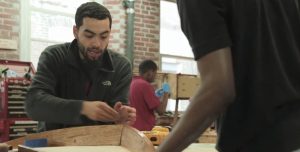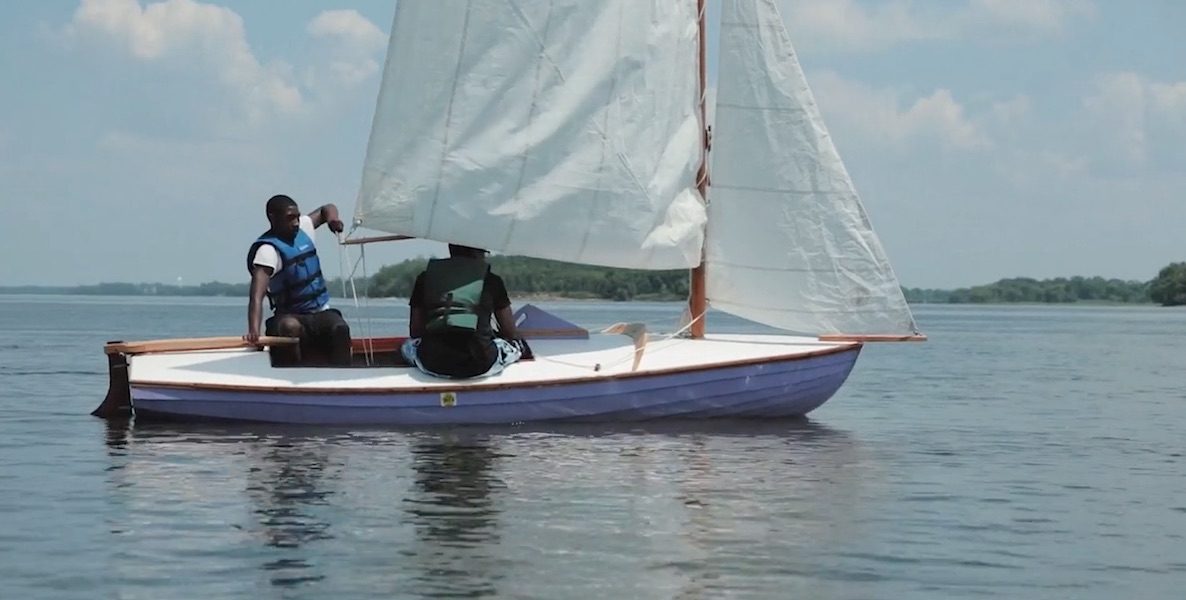“What we’re doing is moving this lip so this piece will lay perfectly flat,” says Jesus Castro, leaning over the bones of a sailboat turned upside down, to three attentive teenaged boys. A moment later, he asks them to put this knowledge into action, and show him another spot where a similar maneuver is required. One of the boys points to a place further toward the boat’s keel. “Good.”
Learn About Philadelphia Wooden Boat Factory's ProgramsDo Something
Philadelphia Wooden Boat Factory is an after-school apprenticeship program for youth between the ages of 14 and 21 from local high schools and an alternative school, El Centro De Estudiantes, which caters to students who have left district schools. The programs are purposefully kept small—only 18-20 in the studio on a given day—so apprentices receive hands-on training in constructing sailboats and rowboats as well as sailmaking and how to sail.
Students are recruited through presentations at their schools, and come of their own accord. But once in the door, they tend to stick around: Philadelphia Wooden Boat Factory apprentices average 350 hours in the shop a year, approximately one third of the time a Philadelphia district student spends in school. PWBF also has a program called Riverguides, in which students learn about watershed protection and environmental science, strengthening their STEM skills.
“In boat building,” says Philadelphia Wooden Boat Factory apprentice Yamir Jackson-Adens, “you’re free to move. You don’t have a whole lot of restrictions. It’s more of a trial-and-error kind of thing. You learn from those mistakes. In school, if you fail, you’ve failed.”
Andy Cintron, now a program assistant at PWBF, began as a student apprentice when he was a 19-year-old student at El Centro. “I had a hard time in high school,” Cintron says. “But I liked working with my hands and when they told me I could have the opportunity to build a boat, I jumped on it. Then when we launched that first boat and it didn’t sink and I could say, I built that, it was the most amazing feeling.”
Cintron says part of what’s so influential about being taught boat building is how it increases your critical thinking and problem solving capabilities, since most of boat building is working with curves and odd angles; there are very few 45 or 90 degree angles, like in carpentry work.
Pairing the craft of wooden boat building—a practice that fell out of favor when fiberglass boats became viable—and underserved youth in Philadelphia makes sense: “They’re both being forgotten,” says Castro, who came to PWBF from the Camden program. “I’ve heard a lot of kids say, boats take you somewhere. For a lot of these kids, somewhere has not been an option.”
Founded in 1996, Philadelphia Wooden Boat Factory is part of a loose network of programs that recognize the potential in this connection between traditional sailing skills and underserved youth; similar initiatives exist in Seattle, Alexandria, and closer to home, Camden. But the roots of the idea go much further back—to the first Outward Bound programs, which were at sea and predicated on the idea that teaching sailing skills to young people also teaches character.
A sailing and boatbuilding education, says PWBF’s Executive Director Brett Hart, is uniquely positioned to provide courage, tenacity, and competency—qualities that all youth development programs are trying to build.
Starting with its founder Geoffrey McKonly, Philadelphia Wooden Boat Factory has always had a strong educational model that stresses developing the strengths young people already have, giving them a lot of say in their learning, and letting them try and fail and learn from the process of that failure.
Hart describes one of his early days at PWBF: “Thirty kids had just come in, they were very high energy, it was their first day in the shop. The kids were standing around impatiently and Geoff wasn’t telling them to do anything. My toes were curling from the awkwardness of the moment, all of my teacher instincts were screaming, take control! But Geoff didn’t. Finally, one of the kids came over to Geoff and said, ‘Hey! Can we start?’ Geoff said, ‘Sure, you know what to do.’ And so the kid did; he just got up on a milk crate and started chiseling. And I thought, ‘Whoa, this guy’s got an idea.’ That was the sea change. The next thing I know, I am up with him at three in the morning saying, ‘Did I do right by that kid, what could I have done better?’”
In 2010, Hart took the reins and made the program an after school apprenticeship, which he feels is a better fit with kids’ schedules and needs. Though it currently recruits students mainly in 10th and 11th grades, Hart says PWBF is considering expanding its program to become a comprehensive experience starting in the summer of 7th grade and continuing through the summer of 12th grade. They are also experimenting with the idea of empowering older high school youth to become both academic and boat building mentors for these new younger students. Further, he wants to pilot a full two week sailing camp and competitive sailing team.
But what Philadelphia Wooden Boat Factory really wants its students to learn is social and emotional learning, by focusing on cultivating resilience—the ability to recover from failure and disappointment.
“Our kids are incredibly resilient coming in the door,” says Hart, but they often lack the support of caring adults and the past experiences that show them that failure is part of the process of becoming a stronger learner, artist, or human. In fact, at PWBF, failure and recovery is part of the curriculum, and leads to other learned skills like coping, character and control.
Pairing the craft of wooden boat building—a practice that fell out of favor when fiberglass boats became viable—and underserved youth in Philadelphia makes sense: “They’re both being forgotten,” says Jesus Castro. “I’ve heard a lot of kids say, boats take you somewhere. For a lot of these kids, somewhere has not been an option.”
“As they work with the boats, students get feedback that helps them to recover when things they try don’t work, and to feel safe taking risks in the future,” says Hart. “At first you have a young person sanding a mast. ‘Is this done?’ he keeps asking you. Soon, he is saying, ‘Can I do this any better?’ We don’t correct the work of students because it robs the students of the opportunity to fail. Without failure, there’s no way to know that you’re capable of doing it better.”
“In boat building,” agrees PWBF apprentice Yamir Jackson-Adens, “you’re free to move. You don’t have a whole lot of restrictions. It’s more of a trial-and-error kind of thing. You learn from those mistakes. In school, if you fail, you’ve failed.”
In addition to the hands-on physical activity that boat building requires, apprentices are also exposed to other stress-reduction activities like mindfulness meditation, and counseling; each apprentice receives a session with on-staff social worker Emma Bergman every two weeks.

The result has been national recognition for Philadelphia Wooden Boat Factory’s effectiveness. Two years ago, it became one of eight organizations to receive $100,000 from the Susan Crown Exchange. “In return, [the billionaire benefactor] asked them to gather three times over the two-year period of the grant to dissect what they were doing and why it had proved successful. Her goal was to find the secret sauce and reveal it to other organizations trying to do similar work,” The New York Times reported.
Further, PWBF’s graduates are thriving. Kimo Merced, who graduated in 2015, received a scholarship to an elite boat building college in Kennebunkport, Massachusetts.
“Growing up in North Philadelphia surrounded by a lot of negative attitudes and environmental hazards, I never thought I had the opportunity to follow a dream of mine,” wrote Merced in a reflection in a Philadelphia Wooden Boat Factory brochure. “The Philadelphia Wooden Boat Factory has become that dream. My work here has taught me that hardships and working hard are key to becoming happy.”
Header Photo: Courtesy of the Philadelphia Wooden Boat Factory




